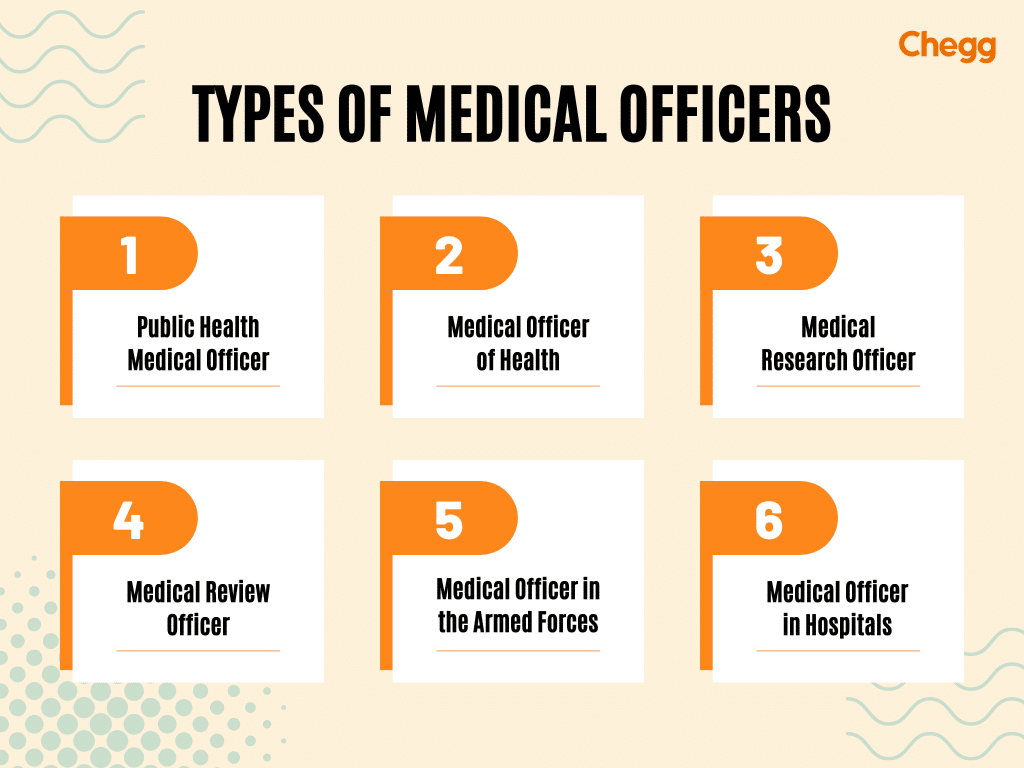Home » Career Guidance » How to Become Medical Officer: Eligibility, Jobs, Scope & Salary
How to Become Medical Officer: Eligibility, Jobs, Scope & Salary


Quick Summary
- A medical officer is a healthcare professional who holds a position of authority or responsibility within a medical organization or institution.
- To become a medical officer, one must earn an MBBS degree, complete an internship, obtain a license and gain clinical experience.
- The average salary of a medical officer is 6.6 lakhs per annum.
Table of Contents
Unlike the common notion that a medical career can be either a doctor or a nurse, a medical officer is yet another career option for medical students. However, a medical officer’s job is quite similar yet different from other medical roles. They carry out clinical jobs and manage the hospital. Plus, they also act as a link between the hospital staff and the top-tier officers. In this article, you will learn how to become a medical officer.
The country’s current doctor-to-population ratio is 1:834, assuming the availability of 5.65 lakh AYUSH doctors and 80% of certified allopathic doctors. The government has also taken action to improve the country’s access to doctors. The number of UG seats for MBBS has grown by 75% from 51,348 before 2014 to 89875 seats as of now.
To become a medical officer, you need to clear the state or UPSC exam along with an MBBS and a few years of work experience. Over the years, there’s been a surge in the demand for MOs, mainly after COVID-19.
In this article, we’ll discuss the eligibility and education required for becoming an MO and a step-by-step plan for becoming a medical officer in India.
Medical Officer v/s Doctor
Here is what distinguishes a medical officer from a doctor:
| Aspect | Medical Officer | Doctor |
| Qualifications | Bachelor’s degree in medicine, nursing, or a related field with an internship. | An undergraduate course(MBBS, Bachelor of Surgery or equivalent) followed by a 1-year internship or residency program. |
| Work Setting | Primarily in healthcare centers | Hospitals, private practice, medical centers |
| Responsibilities | Assess patient health, choose treatments, advise staff | Diagnosis, treatment, patient care |
| Employment Opportunities | Government, healthcare centers | Government, hospitals, private practice |
| Skills Required | Good speaking skills, ability to work under pressure, medical and business proficiency. | Good speaking skills, ability to work under pressure, medical expertise |
Types Of Medical Officers
There are many types of medical officers. Their roles and duties can vary depending on the country, or organization they work. Here’s a quick brief of some types of MOs:

1. Public Health Medical Officer
A public health medical officer (MOH) is a physician who is responsible for protecting and promoting the health of a population. To become a public health medical officer, you typically need a medical degree (MD or DO) and a residency in public health or preventive medicine. Some MOHs also have a master’s degree in public health (MPH).
2. Medical Officer of Health
A medical officer of health (MOH) is a physician who is responsible for protecting and promoting the health of a population. MOHs work to develop and implement public health policies that promote the health of the population. This includes working with government officials, other health professionals, and the public to develop consensus on public health goals and priorities.
3. Medical Research Officer
A medical research officer (MRO) is a healthcare professional who is responsible for conducting and managing medical research. The Bureau of Labor Statistics projects that the employment of medical scientists, which includes MROs, will grow 16% from 2020 to 2030, much faster than the average for all occupations due to the increasing demand for medical research to develop new treatments and cures for diseases.
4. Medical Review Officer
An MO works in the field of medicine and notices and makes out medical data related to workplace drug testing and substance abuse programs. MROs may review medical records, interview the individual who tested positive, and consider other factors to determine if there is a legitimate medical explanation for the positive drug test.
5. Medical Officer in the Armed Forces
Medical officers in the armed forces are responsible for providing preventive care, diagnosing and treating illnesses and injuries, and conducting research. They also play a role in training other medical personnel and in developing medical policies.
6. Medical Officer in Hospitals
Medical officers in hospitals are responsible for diagnosing and treating illnesses and injuries, ordering and interpreting tests, and prescribing medications. They also play a role in educating patients about their health and in coordinating their care with other healthcare providers.
These are just a few types of medical officers. The roles and duties of a medical officer can vary greatly depending on their study and the place or industry they’re working at.
Also read: Paramedical Courses: Programs, Opportunities, and Career Paths
Steps on How to Become a Medical Officer in India
Becoming a medical officer requires a good amount of study and training. One also needs a license and certificate. Here are the steps required for becoming a medical officer in detail:
1. Attain the Medical Officer Qualifications
To become a medical officer in India, you must meet the medical officer eligibility criteria:
- Complete your 10+2 with science as the main subject.
- Appear for and clear the National Eligibility cum Entrance Test (NEET).
In this way, they can gain entry to a Bachelor of Medicine and Bachelor of Surgery (MBBS) program, a five-and-a-half-year course.
2. Specialize in a Field
After completing MBBS, you can choose a specialized field of medicine. You can pursue a PG degree, such as a Doctor of Medicine (MD) or Master of Surgery (MS). This process can take between three to six years. It depends on the field of study.
3. Licensure and Certification
To practice medicine, you must obtain a license from the Medical Council of India (MCI) or your state medical council. They must also complete a must 1-year internship program in a hospital or clinic. Then, they can apply for their license. Plus, they can also choose to obtain certificates from medical entities to enhance their skills and knowledge.
Thus, becoming a medical officer in India needs high education and training but can lead to a rewarding career in the healthcare field.
Also read: Best Career Opportunities & Courses after BAMS

Courses to Pursue to Become a Medical Officer
Here are a few courses you can pursue to become a medical officer:
| Courses | BAMS (Bachelor of Ayurvedic Medicine and Surgery). | BHMS (Bachelor in Homeopathic Medicine and Surgery). | MBBS (Bachelor of Medicine, Bachelor of Surgery). |
| Course Time | 5.5 years | 5.5 years | 5 years with 6 months of training. |
| Eligibility | You must have completed class 12th in Physics, Chemistry, and Biology and cleared the NEET exam. | You must have completed class 12th in PCB and cleared the NEET entrance exam. | National Institute of Homeopathy Dr D Y Patil Homeopathic Medical College Anuradha Homeopathic Medical College |
| Entrance Exams | NEET | NEET, KEAM, PUCET, IPU CET | NEET |
| Top Colleges | Banaras Hindu University IMS Varanasi KLE University Bharati Vidyapeeth Deemed University | National Institute of Homeopathy Dr D Y Patil Homeopathic Medical College Anuradha Homeopathic medical college | AIIMS National Institute of Medical Health & Neuro Sciences. PGIMER King George’s Medical University |
| Course Fees (average) | INR 20,000 – 3,00,000. | INR 12,000 – 2,00,000. | INR 5000 – 10,00,000. |
Also Read: BDS Course: Your Path to Become a Dentist
Average Salary of a Medical Officer
The average salary for a CMO in a hospital in India depends on multiple factors. These include your experience, place of work, and the entity you work for. Data suggests that the average salary is Rs. 6.6 lakhs per annum.
Given below is a detailed list of the chief medical officer’s salary in India across experience levels:
| Levels | Approx. Salary (in Rs./annum). |
| Freshers | Rs. 6.5 lakhs per annum. |
| Mid-level | Rs. 8.5 lakhs per annum. |
| Experienced/Senior-Level | Rs. 11 lakhs per annum. |
Must-have Skills to Become a Medical Officer
Becoming a medical officer needs good academic knowledge with practical and various social skills. Here are some must-have skills to become a medical officer:
Medical Knowledge
A medical officer must have a strong knowledge of medical sciences, including anatomy, physiology, pharmacology, and pathology.
Clinical Skills
Must possess clinical skills to detect and treat patients, assess diagnostic tests, prescribe medicines, and perform medical actions.
Communication Skills
Good communication is a must for a medical officer to explain medical conditions, treatments, and processes to patients and their families.
Attention to Detail
A medical officer must notice the finer details to make the correct diagnosis and prescribe the right treatment.
Interpersonal Skills
Medical officers work in a team. You must have very good social skills to work in a group with other MOs and staff.
Empathy
Compassion and empathy are must traits for medical officers. Because they frequently work with patients who are going through a difficult moment.
Leadership and Teamwork
Medical officers often work as part of a healthcare team. As a result, the ability to lead and collaborate effectively with others is essential.
These are just a few examples of different specializations for medical officers. They can also specialise in fields including pulmonology, rheumatology, and urology.
Related Read: Best Medical Colleges in the World for Aspiring Doctors
Key Takeaways
A medical officer is a healthcare professional with a medical degree. They are often responsible for overseeing district, state, or national public health policies and programs.
To become a medical officer in India, one must first complete a higher secondary education with science as a major subject. Then, to be admitted to the Bachelor of Medicine and Bachelor of Surgery (MBBS) curriculum, the National Eligibility Cumulative Entrance Test (NEET) must be passed.
After completing their MBBS, candidates can choose to specialize in a particular field of medicine. They can pursue a postgraduate degree such as a Doctor of Medicine (MD) or Master of Surgery (MS).
To practice medicine in India, candidates must obtain a license from the Medical Council of India (MCI) or the respective state medical council. Then one must complete a mandatory one-year internship program in a hospital or clinic.

Frequently Asked Questions
The most common and preferred degree for a Medical Officer is MBBS (Bachelor of Medicine and Bachelor of Surgery). It is a 5-year course (at the Undergraduate level). It is often cited as one of the primary CMO qualifications.
No, an MBBS degree is typically required to become a Medical Officer. However, some countries may have alternative pathways to becoming a Medical Officer. These are completing a bachelor’s degree in a related field, and then pursuing a specialized medical degree or training.
To become a medical field officer, one typically needs to complete a medical degree such as MBBS, and then gain relevant work experience. Some countries or organizations may have additional requirements, such as passing a licensing exam or completing specialized training.
No, a Medical Officer is typically not higher than a Doctor. In most cases, a Medical Officer is a doctor who holds a specific position or role within an organization or government agency.
The highest post in the medical field is typically that of a specialist or consultant doctor. These people have advanced training in a specific area of medicine. They have a lot of experience in their domain.
Yes, a Medical Officer typically holds an MBBS degree or an equivalent medical degree.
To read more related articles, click here.
Got a question on this topic?